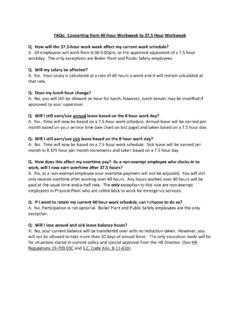Transcription of THE CITADEL
1 CATALOG ISSUE2020-2021 THE CITADELTHE MILITARY COLLEGE OF SOUTH CAROLINACHARLESTON, 1842 Leadership Since 1842, The CITADEL has molded individuals into leaders. As we enter a new millennium, The CITADEL reaffirms its belief that the whole person is one who is worthy of the trust of others. The following qualities of leadership will be the guiding principles for The CITADEL as we develop a new generation of leaders to serve their families, their communities, their professions, and their Core ValuesHonor Duty RespectThe Characteristics of Principled LeadershipLead with humility Embrace a true, authentic self Act and speak with courageDevelop and value people and resourcesEmpower and hold others accountableRespect others by building trust and learning from mistakesServe others before self These characteristics will guide our behavior and serve as our moral compass in all that we say and Glenn M.
2 Walters, USMCP residentBrigadier General Sally C. Selden, , SPHRP rovost and Dean of the CollegeTable of ContentsAcademic Calendar ..6 History of The Information ..12 Requirements for Admission ..16 Academic Policies ..24 Student Support Programs, Services, and Activities ..50 Military Policies ..63 ROTC ..79 Financial Aid and Scholarships ..83 Department of Intercollegiate Athletics ..94 The CITADEL Honors Program ..96 The Undergraduate Curriculum ..100 Tommy and Victoria Baker School of Business ..110 Department of Accounting and Finance ..114 Department of Management and Entrepreneurship ..128 Department of Marketing, Supply Chain Management, and Economics .144 Zucker Family School of Education ..160 School of Engineering ..174 Department of Civil and Environmental Engineering ..175 Department of Electrical and Computer Engineering.
3 197 Department of Mechanical Engineering ..214 Department of Engineering Leadership and Program Management ..230 School of Humanities and Social Sciences ..231 Department of Criminal Justice ..232 Department of English, Fine Arts, and Communications ..246 Department of History ..264 Department of Intelligence and Security Department of Modern Languages, Literatures, and Cultures ..310 Department of Political Science ..340 Department of Psychology ..368 Swain Family School of Science and Mathematics ..378 Department of Biology ..379 Department of Chemistry ..400 Department of Cyber and Computer Sciences ..420 Department of Health and Human Performance ..436 Department of Mathematical Sciences ..462 Swain Department of Nursing ..474 Department of Physics ..482 Department of Leadership Studies.
4 496 Department of Aerospace Studies ..501 Department of Military Science ..506 Department of Naval Science ..510 Organization Board of Visitors ..516 Executive Staff ..517 Senior Staff ..527 Administrative and Activity Directors ..519 Auxiliary Enterprises ..521 Faculty ..522 Emeriti Faculty ..545 6 The CitadelThe CITADEL Academic Calendar 2020-20212020 Aug. 8 Class of 2024 ReportsAug. 16 Corps of Cadets Upperclass Students ReportAug. 19 Classes Begin for the Corps of Cadets/Day StudentsAug 31 Last Day to Drop/AddSept. 2 Labor Day (Classes Held) Oct. 2-4 Parents WeekendOct. 28 Last Day to Withdraw with a Grade of W Nov. 3 Election DayNov. 24 Fall Furlough Begins after Last Class; SCCC/Day Classes EndNov. 30 Reading DayDec. 1 Exams Begin Online for Corps of Cadets/Day StudentsDec. 10 Exams End for Corps of Cadets/Day Students Winter Furlough Begins2021 Jan.
5 10 Winter Furlough Ends Corps of Cadets ReturnJan. 13 Classes Begin for the Corps of Cadets/Day StudentsJan. 18 Martin Luther King Jr. Day (No Classes)Jan. 19 Last Day to Drop/AddMar. 12 Spring Furlough Begins after Last ClassMar. 21 Spring Furlough Ends Corps of Cadets ReturnMar. 22 All Classes ResumeMar. 27 Corps Day/Recognition DayMar. 30 Last Day to Withdraw with a Grade of W Apr. 28 Exams Begin for Corps of Cadets/Day StudentsMay 4 Exams End for Corps of Cadets/Day StudentsMay 8 CommencementMay 10 Maymester and Summer I Evening Classes BeginMay 24 Memorial Day (No Classes)May 28 Maymester EndsJun. 1 Summer I Day Classes BeginJun. 24 Summer I Evening Classes EndJun. 28 Summer II Evening Classes BeginJun. 29 Summer I Day Classes End Jul. 9 Summer II Day Classes Begin7A Brief Historyof The CitadelEarly YearsThe CITADEL has a long history of preparing its graduates to serve their country , both in civil and military pursuits.
6 The idea of citizen-soldiers, trained to take up arms for their country in time of conflict but prepared to serve with integrity and discipline in all walks of life, has been central to its mission from its early years. In December of 1822, following the discovery of a slave revolt planned by Denmark Vesey, the South Carolina state legislature passed An Act to Establish a Competent Force as a Municipal Guard for the Protection of the City of Charleston and Vicinity. The original CITADEL , intended to serve as an arsenal and guardhouse, was constructed near the site of Charleston s Revolutionary War fortifications. Located just north of Calhoun Street, it stood in a neighborhood of free blacks, working-class whites, and slaves, where it provided a visible reminder of city authority. It was initially intended to house a municipal guard, but was instead guarded first by United States troops and then, during and after the Nullification Crisis in the early 1830s, by local 1833, the legislature voted to consolidate arms and munitions at two locations, the CITADEL in Charleston and the Arsenal in Columbia.
7 In 1842, they voted to replace the local guard with students. Half of the students would pay tuition; the other half would be beneficiary cadets, young men selected from among the poorer residents of each county, whose tuition would be paid by the state. Importantly, all cadets took the same classes and performed the same duties, while uniforms erased social distinctions and rank was based on merit alone. The inclusion of cadets from all counties helped unify the state politically, while the spaces available to beneficiary cadets made The CITADEL one of the only places in the state where the sons of poorer citizens could gain a college education. In their curriculum and military training the schools were modeled on the United States Military Academy at West Point, Norwich (University), and the Virginia Military first classes were taught in 1843.
8 Two years later the CITADEL and Arsenal were combined, so that fourth-class cadets (freshmen) attended classes at the Arsenal, then transferred to the CITADEL for their remaining three years. From the beginning, The CITADEL was known for its high academic standards. Cadets were required to take courses in history, literature, logic, French, moral philosophy, and elocution, a liberal arts education that would prepare them to serve as leaders in public life. Many entered careers in law, medicine, and education. Others were called to religious service, including Bishop Ellison Capers, class of 1857, and William Porcher DuBose, class of 1855, one of the most influential theologians in the Episcopal tradition. Cadets also studied the practical sciences, including chemistry, physics, civil and military engineering, mathematics, astronomy, geology, and surveying.
9 Among the school s early 8 The Citadelalumni, E. L. Heriot, Class of 1847, conducted the first railroad survey west and south of the Rio Grande River, while T. J. Arnold, Class of 1852, designed the harbor and wharves of San Francisco and Oakland, California. Students also studied infantry and artillery tactics, and helped train the state s Palmetto Regiment for service in the Mexican-American War. The Civil War and ReconstructionWhen South Carolina seceded from the Union in December 1860, federal troops were moved from Fort Moultrie to Fort Sumter. To protect the entrance to Charleston Harbor, the Governor of South Carolina ordered a fortification to be constructed on Morris Island. On January 9, 1861, CITADEL cadets who were stationed on Morris Island fired on a steamer, the Star of the West, which had been sent to re-supply Fort January 28, 1861, the Corps of Cadets were incorporated into the military organization of the state as The Battalion of State Cadets.
10 The cadets took part in eight engagements in defense of Charleston and South Carolina. In recognition of their service, the Office of the South Carolina Adjutant General authorized The CITADEL to carry the following battle and campaign streamers:Star of the West, January 9, 1861 Wappoo Cut, November 1861 James Island, June 1862 Charleston and Vicinity, July to October 1863 James Island, June 1864 Tulifinny, December 1864 James Island, December 1864 to February 1865 Williamston, May 1865 The college remained in operation throughout much of the war, and cadets were eligible for commissions in the state s military upon graduation. Of the 224 graduates living at the time of the Civil War, 209 entered the Confederate service. Four graduates achieved the rank of Brigadier General: Johnson Hagood, Ellison Capers, Evander Law and Micah Jenkins. CITADEL graduates were involved in the major battles of the war, including Fort Sumter, First Manassas, Shiloh, Vicksburg, Antietam, Chancellorsville, Gettysburg, Atlanta, and Arsenal Academy burned during the fall of Columbia in 1865 and never reopened.














